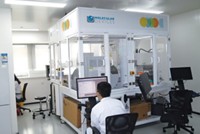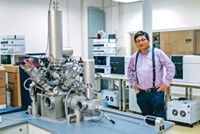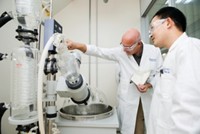Advertisement
Grab your lab coat. Let's get started
Welcome!
Welcome!
Create an account below to get 6 C&EN articles per month, receive newsletters and more - all free.
It seems this is your first time logging in online. Please enter the following information to continue.
As an ACS member you automatically get access to this site. All we need is few more details to create your reading experience.
Not you? Sign in with a different account.
Not you? Sign in with a different account.
ERROR 1
ERROR 1
ERROR 2
ERROR 2
ERROR 2
ERROR 2
ERROR 2
Password and Confirm password must match.
If you have an ACS member number, please enter it here so we can link this account to your membership. (optional)
ERROR 2
ACS values your privacy. By submitting your information, you are gaining access to C&EN and subscribing to our weekly newsletter. We use the information you provide to make your reading experience better, and we will never sell your data to third party members.
Pharmaceuticals
Inventing Drugs For The Chinese People
Major generics producer aims to develop affordable innovative drugs for Chinese patients
by Jean-François Tremblay
June 30, 2008
| A version of this story appeared in
Volume 86, Issue 26

MENTION THE NAME Hengrui to people familiar with pharmaceutical R&D in Shanghai and you get a positive response. The company is known for pursuing some of the most promising drug research projects in China.
Outside the country, however, Hengrui is practically unknown. Some patent lawyers may be aware that Sanofi-Aventis sued Hengrui in 2003, claiming that the Chinese firm infringed its patent on the anticancer drug docetaxel. But even that particular bit of excitement ended a few weeks ago when China's State Intellectual Property Office overturned a lower court decision and ruled that Hengrui could continue to sell its version of the drug in China.
Hengrui's obscurity could end soon if it becomes, as it intends, a fully integrated supplier of innovative drugs. Listed on the Shanghai Stock Exchange and with sales of $300 million in 2007, it is one of China's biggest producers of generic drugs, with a particular strength in oncology. Among its generics competitors in China, Hengrui is virtually alone in seriously attempting to come up with its own drugs.
"We're like the major international pharmaceutical companies," says Tang Peng Cho, chief scientific officer of Shanghai Hengrui Pharmaceuticals, one of the companies in the Hengrui group. "We want to make money from our own drug development."
IN INDIA, it's common for producers of generic pharmaceuticals to invest in new drugs. In China, however, government-funded research institutes or venture capital-funded start-ups undertake most drug research.
Hengrui stands out in other ways. Whereas most Chinese and Indian companies trying to launch drugs are looking to sell them primarily in the U.S. and Europe, Hengrui is first and foremost preoccupied by the needs of Chinese patients. According to Tang, patented drugs made by multinational firms cost more in China than they do in developed countries, even though Chinese patients are generally less affluent. Tang's goal is to come up with compounds that work like existing patented pharmaceuticals but are different enough to qualify for patent protection. "We want to discover drugs that Chinese people outside the big cities can afford," he says.
To this end, the company currently avoids breakthrough research projects and works only on validated biological targets to minimize the risk of failure and compensate for China's relatively weak research capabilities in biology. "Our drugs will be latecomers in markets that are already very crowded," Tang acknowledges. In the future, he says, once it has hired experienced biologists, Hengrui will focus on newer targets.
Jimmy Wei, vice president of business development at the Shanghai-based drug discovery firm Hutchison MediPharma, says Hengrui's approach is valid. "We are thinking of it as well," he says. "It's basically to make high-end generics, to design molecules against validated targets." He says the approach carries the possibility of patent lawsuits, but he believes that risk is limited if a company sells only in China.
Hengrui's drugs will treat diseases that are already common in China or that are becoming more prevalent thanks to the country's increasing affluence. Its main research focus is cardiovascular diseases, but oncology is another important area. Hengrui is conducting human trials in China of treatments for inflammation and cancer.
The research center that Tang leads in the Minhang district of Shanghai employs 140 scientists so far. In business since 2004, it is run in a bold manner. Tang explains that the team leaders, managers who are responsible for six to 10 other scientists, are new Ph.D.s returning from studies abroad. "Straight out of school, our team leaders have 10 people to manage," he says.
Hutchison's Wei is less keen on this aspect of Hengrui's strategy and doubts that giving inexperienced scientists so much responsibility can work. "Drug discovery is a very complex process," he says. "One single area of weakness will lead to failure."
Tang says he and a few other more experienced Hengrui scientists are on hand to provide guidance to the young team leaders. Moreover, he says he is recruiting experienced scientists familiar with animal modeling, chemical development, and molecular biology. For now, Hengrui obtains its animal data through a pact with Shanghai's Institute of Materia Medica, one of the leading drug discovery organizations funded by the Chinese government.
Born in Macau, a special administrative region of China, Tang earned a Ph.D. in organic chemistry in 1984 from the University of Chicago and worked as a postdoc in Gilbert Stork's lab at Columbia University. He was at the drug discovery firm Sugen in San Francisco from 1994 to 2003, the year Pfizer acquired it. At Sugen, Tang managed a staff of 35 scientists in medicinal chemistry. Four of the compounds he worked on progressed to clinical trials, including Sutent, a cancer drug now on the market.
His success in turning Hengrui into a drug innovator will be easily measured by the number of new treatments that it launches commercially. Perhaps by the time it has some drugs on the market, Hengrui will be known as a firm that aggressively defends its own pharmaceutical patents.





Join the conversation
Contact the reporter
Submit a Letter to the Editor for publication
Engage with us on Twitter